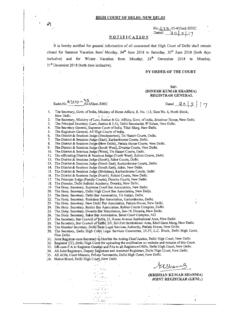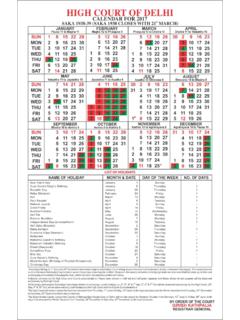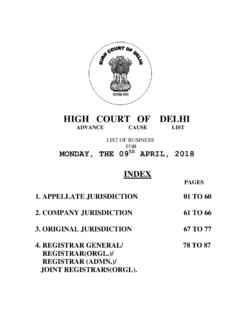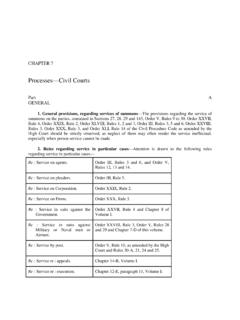Transcription of Ch. 13] Confessions and Statements of Accused Persons
1 CHAPTER 13. Ch. 13]. Confessions and Statements of Accused Persons 1. Statements of Accused at various stages explained The provisions of Sections 164, 342. [Sections 313 of new Code] and 364 [Section 281 of new Code] of the Criminal Procedure Code with regard to the Confessions and Statements of Accused Persons should be carefully studied. Section 164 deals with the recording of Statements and Confessions at any stage before the commencement of an enquiry or trial. Section 342 deals with the examination of Accused Persons during the course of the enquiry or trial.
2 Section 342-A now enables the Accused to appear as a defence witness during the trial and to give evidence on oath in disproof of the charges made against him or a co- Accused . Section 364 prescribes the manner in which the examination of an Accused person is to be recorded. COMMENTS. Where Statements were recorded indicating all necessary precautions prescribed for recording confessional statement, it was held that confession does not suffer from procedural infirmity. (1973) HP 495. 2. Use of confession of Accused during Police trial recorded by Magistrate The object of Section 164, Criminal Procedure Code, is to provide a method of securing a reliable record of Statements or Confessions made during the course of the Police investigation, which could be used, if necessary, during the enquiry or trial.
3 Under Section 25 of the Indian Evidence Act, a confession to a Police Officer is inadmissible in evidence, and hence when an Accused person confesses during the Police investigation, the Police frequently get it recorded by a Magistrate under Section 164, Criminal Procedure Code, and it can then be used to the extent to which it may be admissible under the Indian Evidence Act. 3. Presumption attached to Confessions recorded to Magistrate and its evidential value. Safeguards provided in law to obtain a voluntary and precisely recorded confession . Under Section 80 of the Indian Evidence Act, a Court is bound to presume that a statement or confession of an Accused person, taken in accordance with law and purporting to be signed by any Judge or Magistrate, is genuine, and that the certificate or note as to the circumstances under which it was taken purporting to be made by the person signing it, are true, and that such statement or confession was duly taken.
4 The words taken in accordance with law occurring in this section are very important and it is essential that in recording a statement or confession under Section 164, the provisions of that section should be strictly followed. The evidential value of a confession depends upon its voluntary character and the precision with which it is reproduced and hence the section provides safeguards to secure this end. These safeguards are of great importance, as Confessions are often retracted at a later stage and it becomes necessary for the Court to ascertain whether the alleged confession was actually and voluntarily made.
5 The mere fact that a confession is retracted does not render it in admissible in evidence, but the Court has to scrutinise any such confession with the utmost care and accept it with the greatest caution. It is a settled rule of evidence that unless a retracted confession is corroborated in material particulars it is not prudent to base a conviction in a criminal case on its strength alone, (Vide 1953 SC 459) unless from the peculiar circumstances under which it was made or judging from the reasons alleged or apparent, of retraction, there remains a high degree of certainly that the confession, notwithstanding its having been resiled from, is genuine.
6 [Vide 30 1914 (Cr.) and 1954 SC 4]. COMMENTS. No hard and fast rule can be laid down regarding the necessity of corroboration in the case of a retracted confession in order to base a conviction thereon. But apart from the general rule of prudence where the circumstances of a particular case cast a suspicion on the genuineness of the confession it would be sufficient to require corroboration of the retracted confession. A confession should not be accepted merely because it contains a wealth of detail which could not have been invented. Unless the main features of the story are shown to be true, it is unsafe to regard mere wealth of uncorroborated detail as a safeguard of truth.
7 Muthuswami, vs. State of Madras, AIR 1954 SC 4. It is a settled rule of evidence that unless a retracted confession is corroborated in material particulars, it is not prudent to base a conviction in a criminal case on its strength alone. Puran, S/o. Sri Ram, vs. The State of Punjab, AIR 1953 SC 459. 4. Important features of Section 164, Criminal Procedure Code Some important features of Section 164 are : (a) Statements or Confessions made in the course of an investigation can be recorded only by a Magistrate of the first class or a Magistrate of the second class who has been specially empowered by the State Government.
8 (b) Confessions must be recorded and signed in the manner provided in Section 364. (c) Before recording any such confession the Magistrate shall explain to the person making it that he is not bound to make a confession, and that if he does so it may be used in evidence against him. (d) No Magistrate shall record any such confession unless upon questioning the person making it he has reason to believe that it was made voluntarily; failure to question has been held to vitiate the confession. ( 2 Lahore 325). (e) The memorandum set forth in Section 164(3) must be appended at the foot of the record of the confession.
9 (f) It is not necessary that the Magistrate receiving or recording a confession or statement should be a Magistrate having jurisdiction in the case. Note In districts in Which the experiment of separation of Judiciary from the Executive is being tried the work relating to recording of Confessions and Statements under Section 164 of the Code and dying declarations should be done by Judicial Magistrates. (Punjab Government Letter No. 16848-G-55 11327, dated the 16th February, 1956, to all Deputy Commissioners in Punjab). 5. Form prescribed for recording Confessions The annexed form for recording Confessions taken under Section 164 has been prescribed and should invariably be used.
10 COMMENTS. The police investigating agency in our country has not yet acquired the reputation of being proof against the temptation of attempting to secure Confessions by questionable methods; the Magistrates recording Confessions are therefore expected to devote due attention to all the safeguards provided for ensuring their truly voluntary character. The judicial officers administering criminal law should not ignore that in a civilized and free society, it is largely through justice that the position of the liberty of the subject and of the rule of law is measured.
















